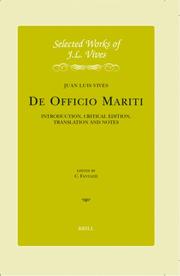| Listing 1 - 6 of 6 |
Sort by
|

ISBN: 9004154043 9789004154049 9786611400675 128140067X 9047411056 Year: 2006 Publisher: Leiden ; Boston : Brill,
Abstract | Keywords | Export | Availability | Bookmark
 Loading...
Loading...Choose an application
- Reference Manager
- EndNote
- RefWorks (Direct export to RefWorks)
This treatise is a sequel to Vives' On the Education of the Christian Woman , published in Brill's series, Selected Works of J.L. Vives. It studies the institution of marriage from a male vantage point, with interesting observations on female psychology, anticipating his later work, De anima. Vives insists more here on the weakness and instability of the woman than in the previous treatise, relying on the biological tenets of Aristotle and Galen. Much attention is given to the choice of a wife and to the husband's role as tutor of his spouse and disciplinarian. The marriage debt is regarded as a necessary evil, as in St. Paul, while the spirituality of the union is exalted. The book was often printed together with the De institutione feminae Christianae and even considered as a fourth book of that work.
Neo-Latin literature --- Marriage --- Social ethics --- Women --- Education --- Ethics --- Social problems --- Sociology --- Social ethics. --- Education of women --- Women's education --- Education. --- Mariage --- Ouvrages avant 1800

ISBN: 1281126128 9786611126124 0226858162 9780226858166 0226858146 9780226858142 0226858154 9780226858159 9781281126122 Year: 2000 Publisher: Chicago : University of Chicago Press,
Abstract | Keywords | Export | Availability | Bookmark
 Loading...
Loading...Choose an application
- Reference Manager
- EndNote
- RefWorks (Direct export to RefWorks)
"From meetings and conversation with men, love affairs arise. In the midst of pleasures, banquets, dances, laughter, and self-indulgence, Venus and her son Cupid reign supreme. . . . Poor young girl, if you emerge from these encounters a captive prey! How much better it would have been to remain at home or to have broken a leg of the body rather than of the mind!" So wrote the sixteenth-century Spanish humanist Juan Luis Vives in a famous work dedicated to Henry VIII's daughter, Princess Mary, but intended for a wider audience interested in the education of women. Praised by Erasmus and Thomas More, Vives advocated education for all women, regardless of social class and ability. From childhood through adolescence to marriage and widowhood, this manual offers practical advice as well as philosophical meditation and was recognized soon after publication in 1524 as the most authoritative pronouncement on the universal education of women. Arguing that women were intellectually equal if not superior to men, Vives stressed intellectual companionship in marriage over procreation, and moved beyond the private sphere to show how women's progress was essential for the good of society and state.
Christian women --- Women, Christian --- Women --- Conduct of life --- Education --- 873.4 VIVES, JUAN LUIS --- 873.4 VIVES, JUAN LUIS Humanistisch Latijnse literatuur--VIVES, JUAN LUIS --- Humanistisch Latijnse literatuur--VIVES, JUAN LUIS --- educational, gender, sexuality, women, womens issues, christianity, faith, belief, religion, religious studies, learning, advocacy, advocate, feminism, feminist, activism, activist, thomas more, erasmus, history, historical, 16th century, 1500s, renaissance, childhood, adolescence, marriage, widowhood, advice, philosophy, philosophical, intellectual, instruction, behavior, moral, ethics, virginity, husband, couples, culture, cultural, society, customs.
Book
ISBN: 1280496312 9786613591548 9004228624 9789004228627 9004223649 9789004223646 9781280496318 6613591548 Year: 2012 Publisher: Leiden ; Boston : Brill,
Abstract | Keywords | Export | Availability | Bookmark
 Loading...
Loading...Choose an application
- Reference Manager
- EndNote
- RefWorks (Direct export to RefWorks)
This is a critical, annotated, bilingual edition, with introduction and cumulative indices, of the last three of Vives' five speeches on the abdication of Sulla, the Roman Republican dictator. These five declamations form an unprecedented dramatic ensemble, grounded in thorough familiarity with the ancient sources, but amplified occasionally by elements of historical fiction. The third oration is Sulla's formal abdication, defending his sometimes savage record. In the fourth, Sulla's enemy Lepidus the new consul promises to undo Sulla's program; in the fifth, at Sulla's death, Lepidus continues his unrestrained attack on Sulla's morals, henchmen, and constitutional alterations. The five-speech ensemble, dedicated to the Emperor Charles V's youthful brother Ferdinand, explores political and ethical issues while exemplifying Vives' remarkable generic versatility.
Speeches, addresses, etc., Latin (Medieval and modern) --- Statesmen --- Latin orations, Medieval and modern --- Latin speeches, Medieval and modern --- Sulla, Lucius Cornelius. --- Sylla, Lucius Cornelius --- Sulla Felix, Lucius Cornelius --- Silla, Lucius Cornelius --- Scilla, Lucius Cornelius --- Silla, Lucio --- Syllas, Leukios Kornēlios --- Rome --- History
Book
ISBN: 900435476X 9789004354760 9004354778 9789004354777 Year: 2017 Publisher: [S.l.] : BRILL,
Abstract | Keywords | Export | Availability | Bookmark
 Loading...
Loading...Choose an application
- Reference Manager
- EndNote
- RefWorks (Direct export to RefWorks)
Juan Luis Vives’ 1533 treatise on rhetoric, De ratione dicendi , is a highly original but largely neglected Renaissance Latin text. David Walker’s critical edition, with introduction, facing translation and notes, is the first to appear in English. The conception of rhetoric which Vives elaborates in the De ratione dicendi differs significantly from that which is found in other rhetorical treatises written during the humanist Renaissance. Rhetoric as Vives conceives it is part of the discipline of self-knowledge, and involves a distinct way of thinking about the way kinds of rhetorical style manifested modes of human life. Moving as it did from the concrete particulars of a man’s style to their abstractable implications, the study of rhetoric was for him a form of moral thinking which enabled the student to develop a critical framework for understanding the world he lived inches.
Latin language, Medieval and modern --- Rhetoric --- Rhetoric, Ancient. --- Ancient rhetoric --- Classical languages --- Greek language --- Greek rhetoric --- Latin language --- Latin rhetoric --- Vives, Juan Luis, --- Vives, Ludovik, --- Vives, Joannes Ludovicus, --- Vives, Luis, --- Vives, Joh. Ludov., --- Viues, Iean Louys, --- Vives, Juan Luis --- Vives, Jan Ludovicus --- Vives, Joannes Ludovicus --- Vives, Giovanni Lodovico --- Viues, Jean Louys, --- Vives, J. L. --- Vives, Joan Lluís, --- March, Juan Luis Vives y, --- March, Joan Lluïs Vives i, --- Vives March, Juan Luis, --- Vives, Lluïs, --- Vives, Io. Lodovicus --- Vives, Ioannes Lodovicus, --- Vives, Ludovicus Valentinus
Book
ISBN: 3110948842 9783110948844 9783598719363 3598719361 Year: 1984 Publisher: Leipzig : Teubner,
Abstract | Keywords | Export | Availability | Bookmark
 Loading...
Loading...Choose an application
- Reference Manager
- EndNote
- RefWorks (Direct export to RefWorks)
Praefatio in Leges Ciceronis et Aedes Legum (Bibliotheca scriptorum Graecorum et Romanorum Teubneriana).
HISTORY / Ancient / General. --- Cicero, Marcus Tullius. --- Cicero, Marcus Tullius --- T︠S︡it︠s︡eron, Mark Tulliĭ --- Cyceron --- Cicéron --- Kikerōn --- Cicerón, M. Tulio --- Ḳiḳero --- Cicerone --- M. Tulli Ciceronis --- Cicéron, Marcus --- Cicerón, Marco Tulio --- Ḳiḳero, Marḳus Ṭulyus --- Tullius Cicero, Marcus --- Cicerone, M. T. --- Kikerōn, M. T. --- Cicerone, M. Tullio --- Cicero --- Cicero, M. T. --- Cyceron, Marek Tulliusz --- ציצרון, מארקוס טולליוס --- קיקרו, מארקוס טוליוס --- קיקרו, מרקוס טוליוס --- キケロ --- 西塞罗
Book
ISBN: 9789462700369 9462700362 9789461661562 9461661568 Year: 2015 Volume: 38 Publisher: Louvain, Belgium : Leuven University Press,
Abstract | Keywords | Export | Availability | Bookmark
 Loading...
Loading...Choose an application
- Reference Manager
- EndNote
- RefWorks (Direct export to RefWorks)
This book aims to make a new contribution to the knowledge on writings of the great humanists of the fifteenth and sixteenth centuries. Certainly, the volume on the exchange of letters between Bude and Vives is thin: it has only ten letters. Despite the small number, these letters undeniably bring an interesting testimony to the intellectual life or, in the case of Bude, on life itself of the humanists. All letters are accompanied by an exhaustive commentary and a French translation, as well as an index fontium and an index nominum.
Neo-Latin literature --- Budé, Guillaume --- Vivès, Juan Luis --- Correspondance latine médiévale et moderne --- Humanisten -- Brieven --- Humanisten -- Correspondentie --- Humanistenbrieven --- Humanistes -- Correspondance --- Humanistisch-Latijnse brieven --- Humanists -- Correspondence --- Latijnse brieven [Middeleeuwse en moderne ] --- Latin letters [Medieval and modern ] --- Lettres (Genre littéraire) latines humanistes --- Lettres (Genre littéraire) latines médiévales et modernes --- Lettres (Genre littéraire) néo-latines --- Littérature épistolaire latine médiévale et moderne --- Medieval and modern Latin letters --- Middeleeuws-Latijnse brieven --- Neolatijnse brieven --- Humanists --- Humanistes --- Correspondence. --- Correspondance --- Budé, Guillaume, --- Vives, Juan Luis, --- Budé, Guillaume (1468-1540) --- Vives, Juan Luis (1492-1540) --- Academic collection --- 378.4 <493 LEUVEN> --- 873.4 VIVES, JUAN LUIS --- 094 VIVES, JUAN LUIS --- Universiteiten--België--LEUVEN --- Humanistisch Latijnse literatuur--VIVES, JUAN LUIS --- Oude en merkwaardige drukken. Kostbare en zeldzame boeken. Preciosa en rariora--VIVES, JUAN LUIS --- Philosophy & Religion --- Philosophy --- 094 VIVES, JUAN LUIS Oude en merkwaardige drukken. Kostbare en zeldzame boeken. Preciosa en rariora--VIVES, JUAN LUIS --- 873.4 VIVES, JUAN LUIS Humanistisch Latijnse literatuur--VIVES, JUAN LUIS --- 378.4 <493 LEUVEN> Universiteiten--België--LEUVEN --- Budé, Guillaume, --- personal correspondence --- humanists [people] --- Bud --- Correspondence --- Vives, Juan Luis --- Correspondance. --- Bud©8 --- 378.4 <493 LEUVEN> Universities--Belgium--LEUVEN --- Universities--Belgium--LEUVEN --- Scholars --- Bude, Guillaume, $d1468-1540 --- Vives, Ludovik, --- Vives, Joannes Ludovicus, --- Vives, Luis, --- Vives, Joh. Ludov., --- Viues, Iean Louys, --- Vives, Jan Ludovicus --- Vives, Joannes Ludovicus --- Vives, Giovanni Lodovico --- Viues, Jean Louys, --- Vives, J. L. --- Vives, Joan Lluís, --- March, Juan Luis Vives y, --- March, Joan Lluïs Vives i, --- Vives March, Juan Luis, --- Vives, Lluïs, --- Vives, Io. Lodovicus --- Vives, Ioannes Lodovicus, --- Budé, Guillaume (1468-1540) --- Humanists - France
| Listing 1 - 6 of 6 |
Sort by
|

 Search
Search Feedback
Feedback About UniCat
About UniCat  Help
Help News
News